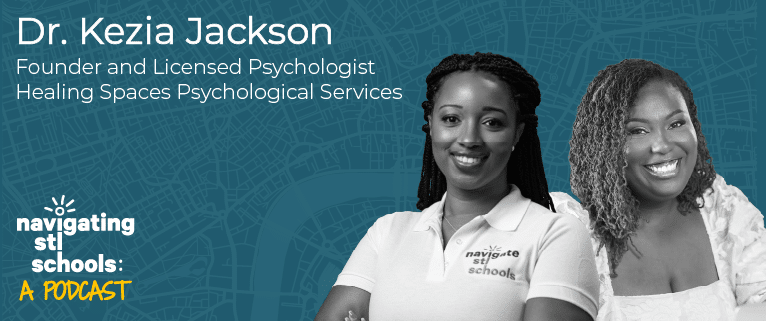Healing Spaces and Emotional Intelligence in Education with Dr. Kezia Jackson
February 3, 2025

“Mental health services are something that is very proactive. So, yes, you can come when you’re at your breaking point, but let’s prevent you from getting there.”
Dr. Keziah Jackson
Today’s guest is Dr. Kezia Jackson, Founder and Licensed Psychologist at Healing Spaces Psychological Services. Dr. Jackson sat down with Staci to discuss the work Healing Spaces does, the importance of proactive mental health care for students, and the impact of social media in the mental health space.
- K-12 education
- Dr. Jackson is from Maryland, where she went to public school.
- Coming from a public school lens has helped provide a good reframe for her career today.
- What is Healing Spaces?
- Healing Spaces Psychological Services is a group practice out of Clayton, Missouri.
- Their primary goal is to uplift families and individuals while providing passionate, effective, and inclusive care.
- Their vision is for people of color to have a safe space to heal.
- What is a safe space?
- To create a safe space, it’s important for individuals to come in as themselves, plus stat numbers.
- It used to be that you have to come in, look a certain way, how you talk, dress, etc a different way.
- Why are older people so reluctant to seek mental health therapy?
- There’s a stigma among older people to not seek out therapy until there is a crisis – a last resort.
- “Mental health services is something that is very proactive. So, yes, you can come when you’re at your breaking point, but let’s prevent you from getting there.”
- Certain institutions haven’t always been safe for Black people. At Healing Spaces, they’re going to make sure you’re comfortable and get a treatment plan that works for you.
- How can the notion that mental health care is preventative care be helpful for students in a school environment?
- At Healing Spaces, Dr. Jackson often evaluates children after there have been a number of behavioral issues showing up. But it helps to get in before that point.
- If they back up and look at what’s going on in the family systems that might be causing issues.
- Are there ways we can start to think about what that level of emotional intelligence can do to the connection and the child’s ability to learn and perceive the ways of the world around them?
- The notion of social-emotional intelligence has been a focus in recent generations.
- In order to teach a child this intelligence, parents need to have an understanding of their own social-emotional intelligence.
- Let’s talk about the roll of social media in mental health right now.
- Social media can be helpful as a starting point to recognize something is going on, but it’s not therapy.
- Certain social media pages are actually very helpful.
- How do you think movies like Inside Out, Coco, have helped parents raise emotionally intelligent children?
- The more we normalize and talk about these things, the more it becomes normal. So, let’s have a movie about grief.
- It’s a good tool for parents to make conversations with kids. How did that make you feel? Tell me about that.
- Are there tips for parents or teachers who are dealing with kids that are having big feelings at the moment?
- Have the kid supported by school counselors and social workers (if they have them).
- Naming feelings can be super helpful. Something like “hey, I noticed that your clenching your fist. Could you be angry right now?”
- Schools should have a feeling wheel to help kids identify
- What does Healing Spaces offer in their practice?
- They try to make it a one-stop shop
- Individual therapy 8+, Couples and family therapy, group therapy, parent training, etc.
- They also offer psychological evaluations, but more importantly figure out where they go to get help.
- How do parents find culturally relevant therapists? And how do you help the kid understand why they need mental health support without stigmatizing them?
- These conversations with parents usually start with an understanding that there is something different or a challenge with their kid.
- Normalizing an issue can be as simple as talking with the kid, and saying “let’s go figure this out with someone” like you would with a physical doctor.
- To find a good cultural fit, it’s good to start with the schools because they already have resources compiled.
- At Healing Spaces, they have lists of therapists who are good for different issues.
- Is it important to find a culturally competent therapist? Or a therapist that specializes in a specific mental health issue?
- Ideally, you’d get both.
- EMDR – eye movement desensitization and reprocessing
- When we talk about these specific therapies, certain treatments have been proven to help treating certain things.
- It’s okay to show up to a therapist and just say “I need help” and go from there, the therapist can help get you to the specialized treatment you need.
- Parents are noticing that there are a lot of IEPs and learning differences, and they think it’s because of the rise of technology and normalizing of therapy.
- Our ability to recognize that something is going on is a lot better.
- Many of the older generation grew up autistic and just had to cope growing up, but an IEP could have been helpful.
- How do people find you?
- Healing Spaces Psychological Services – https://www.healingspacesstl.com/
- You can book an appointment online!